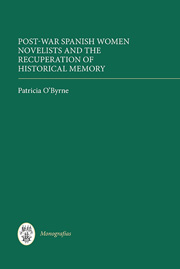Book contents
- Frontmatter
- Dedication
- Contents
- Acknowledgements
- Preface
- Introduction
- 1 Spanish Women Novelists 1940–1960
- 2 Work and Religion: a Right-wing Perspective
- 3 Sexual Abuse and Male Dominion
- 4 Spinsters in Post-war Spain
- 5 Exemplary Mothers and Sexually Liberated Women
- 6 Prostitution, Sexual Ignorance and Sex Outside Marriage
- Afterword
- Works Cited
- Index
3 - Sexual Abuse and Male Dominion
Published online by Cambridge University Press: 05 August 2014
- Frontmatter
- Dedication
- Contents
- Acknowledgements
- Preface
- Introduction
- 1 Spanish Women Novelists 1940–1960
- 2 Work and Religion: a Right-wing Perspective
- 3 Sexual Abuse and Male Dominion
- 4 Spinsters in Post-war Spain
- 5 Exemplary Mothers and Sexually Liberated Women
- 6 Prostitution, Sexual Ignorance and Sex Outside Marriage
- Afterword
- Works Cited
- Index
Summary
Susana March Alcalá (Barcelona, 1915–1990), better known for her poetry than for her fiction, stated in an interview in 1967 that a novelist ‘tiene que ser notario de su época’ (needs to be a ‘recorder’ of her times), ‘un espejo en camino’ (a mirror along the way). This Stendhalian principle has informed her fiction and much of her poetry. However, the author does more than record, she comments openly and critically on the inferior status of women in the post-war era. Following the summary of March's biography and literary career, there is a discussion of the sexual abuse of minors during the dictatorship years by way of introduction to the novelist's portrayal of the sexual abuse of girls and young women in her novelas rosas (romantic novels) and in Algo muere cada día (1955, Something Dies with Each Day). The section on male dominion will explore the representation of men's superior and demeaning attitudes towards women in her more serious fiction. The Conclusion is preceded by a review of her portrayal of marriage. March's emerging feminist consciousness coincides with her more subversive construction of the romantic genre. The opening section to this chapter provides an overview of the key features of the novela rosa and its censorship, an insight which enables the reader to appreciate the novelist's development in her use of this genre, from replicating the formula to subverting it.
- Type
- Chapter
- Information
- Publisher: Boydell & BrewerPrint publication year: 2014



